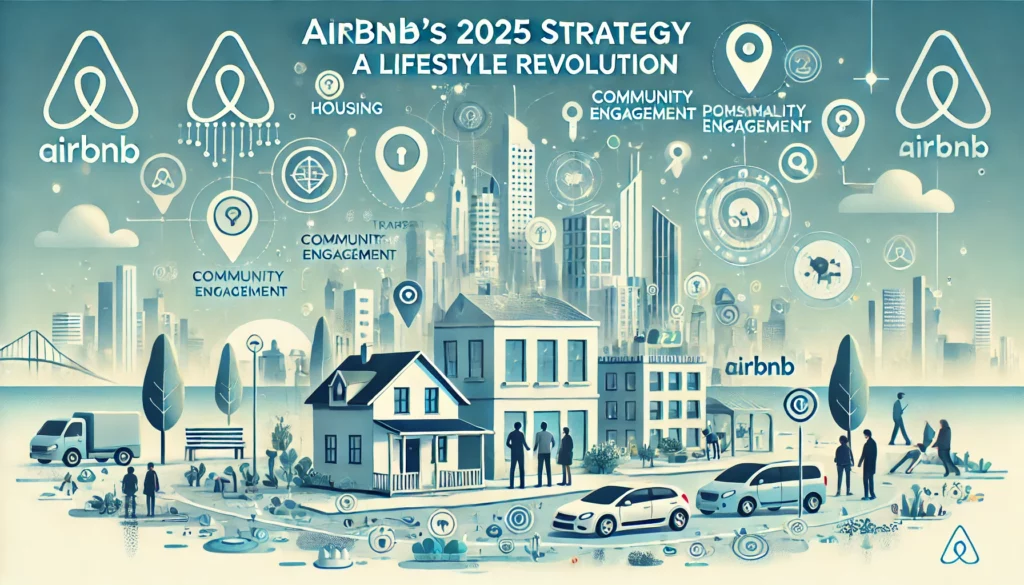For the past two years, Airbnb has followed a clear strategic playbook built on three key pillars: Making Hosting Mainstream, Perfecting the Core Service, and Expanding Beyond the Core. This approach has allowed Airbnb to focus on empowering hosts, improving the guest experience, and testing new business areas. As the company enters 2025, it remains committed to this playbook, but with an increased emphasis on Expanding Beyond the Core, signaling a transformative shift into becoming a comprehensive lifestyle platform.
Brian Chesky, Airbnb’s CEO, likens this evolution to Amazon’s journey from bookseller to “everything store.” He envisions Airbnb as more than just a travel tool, aiming to integrate housing, transportation, and community engagement into a unified app that serves users’ daily needs. This bold vision, however, depends on successful execution, regulatory navigation, and market adoption.
Exploring New Verticals: Beyond Short-Term Rentals
Airbnb is accelerating efforts to Expand Beyond the Core, both by enhancing existing services and entering new markets:
Expanding Current Services:
- Experiences 2.0: Airbnb is revamping its Experiences program to offer more local activities, aiming to make the platform a weekly or even daily companion for users.
- Long Stays: Rentals of 28+ days already account for nearly 20% of Airbnb bookings. This segment is particularly important as many hosts shift toward longer-term stays in response to stricter short-term rental regulations.
- Real Estate Expansion:
- Airbnb-Friendly Apartments: This program now spans over 750 buildings and 200,000 units in the U.S. and has expanded to the United Kingdom, where it has launched nearly 1,500 units in collaboration with Greystar. AFA allows renters to host part-time while giving landlords oversight.
- Airbnb-Friendly Condos: Recently launched, this program helps condo owners and HOAs streamline hosting while addressing concerns like community impact and regulatory compliance. Successful pilots in Miami are setting the stage for international expansion into Latin America in 2025.
Exploring New Ventures:
- Car Sharing: Airbnb is exploring a peer-to-peer car rental marketplace, offering users the ability to rent vehicles as easily as they book accommodations. This expansion could complement the travel experience while providing income opportunities for car owners.
- Roommate Matching: A wild guess from us at Rental Scale-Up! Leveraging its expertise in housing and community-building, Airbnb could create a tool for connecting renters with compatible roommates, addressing housing affordability and loneliness.
Global Reach of New Verticals:
Airbnb’s strategy includes expanding these initiatives internationally, launching them in multiple cities and countries simultaneously. Programs like Airbnb-Friendly Apartments and Condos illustrate how Airbnb is taking its real estate innovations beyond the U.S., establishing itself as a global leader in housing solutions.
Personalization for Guests: The Foundation for an AI Concierge
Airbnb is doubling down on personalization, setting the stage for a potential AI Concierge—a virtual assistant that could guide users across the company’s growing ecosystem.
- Current Features: Airbnb has already introduced tools like suggested destinations, search tips, customized filters, and personalized listing highlights, all designed to make trip planning easier and more intuitive
- Data Advantage: Over years of operation, Airbnb has gathered rich data on user behavior, including guest preferences, host styles, and even details like the type of music played during stays. This treasure trove of insights could power an AI assistant capable of predicting user needs and personalizing recommendations.
- AI Concierge Vision: Chesky has hinted at creating a virtual assistant that could handle everything from planning a trip to finding a roommate. If realized, this tool could make Airbnb a daily-use platform rather than one reserved for occasional travel.
To succeed, Airbnb must ensure these personalized features are integrated seamlessly, secure user trust, and demonstrate clear value across its verticals.
Empowering Hosts: Tools to Stay Competitive
Airbnb remains focused on Making Hosting Mainstream, introducing new tools and programs to help hosts, from casual sharers to professional operators, thrive in a competitive market:
- Host Service Marketplace: In 2025, Airbnb should be launching this new platform to connect hosts with tech service providers, from software that helps with keeping track of maintenance and organize operations, to revenue management software. Why get a PMS where the Airbnb eco-system can connect you with all these providers?
- Co-Host Network: By pairing newer hosts with experienced co-hosts, Airbnb ensures consistent service quality and helps smaller operators compete with professional property managers.
These initiatives are designed to empower hosts, enabling them to meet rising guest expectations while maintaining Airbnb’s commitment to quality and sustainability.
Challenges and Opportunities
Opportunities:
- Data-Driven Innovation: Airbnb’s extensive data collection enables it to deliver highly personalized services, from travel recommendations to car-sharing options.
- Empowering New Entrepreneurs: By providing tools, programs, and education, Airbnb can help more people turn their homes, cars, and other assets into income streams.
- Integrated Ecosystem: Combining housing, transportation, and experiences into a single platform creates a seamless user experience, boosting engagement across verticals.
Challenges:
- Maintaining Focus: Expanding into multiple verticals risks spreading resources thin and distracting from Airbnb’s core business of short-term rentals.
- Navigating Regulations: Each new market, such as car sharing or real estate, comes with its own legal challenges. Airbnb must adapt to different regulatory landscapes while ensuring smooth operations.
- Competing with Established Players: Entering industries dominated by companies like Turo in car sharing or local rental platforms in real estate will require Airbnb to differentiate itself and build trust.
- Ensuring Quality and Trust: Expanding into services like car sharing or roommate matching requires adapting Airbnb’s trusted review and verification systems, which is no small task.
Conclusion
Airbnb’s 2025 strategy demonstrates a commitment to its three strategic pillars: Making Hosting Mainstream, Perfecting the Core Service, and Expanding Beyond the Core. With ambitious plans to introduce new verticals like car sharing, revamp Experiences, and expand real estate programs internationally, Airbnb is positioning itself as a lifestyle platform that goes far beyond travel.
While challenges remain, Airbnb’s ability to leverage its data, empower users, and scale globally gives it a strong foundation for success. If executed well, Airbnb could redefine how people live, travel, and connect, becoming an indispensable part of everyday life.








